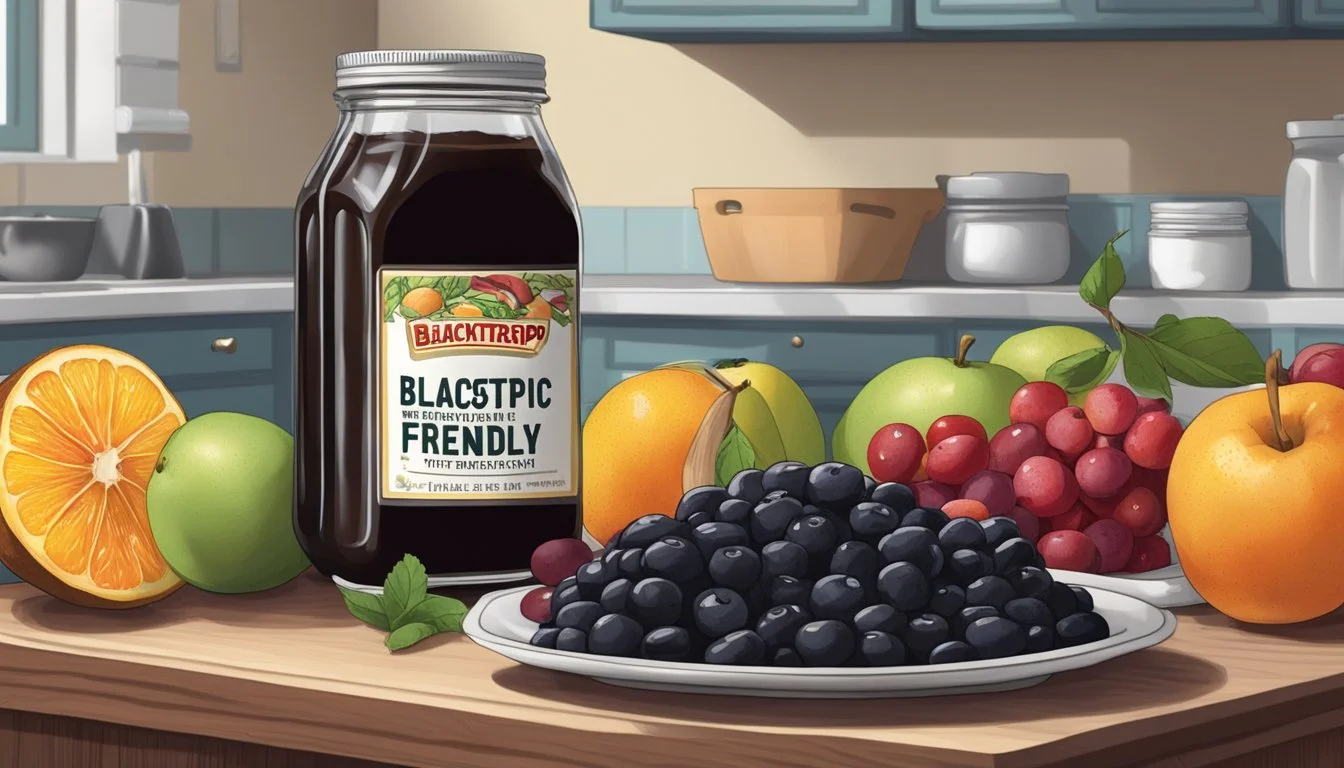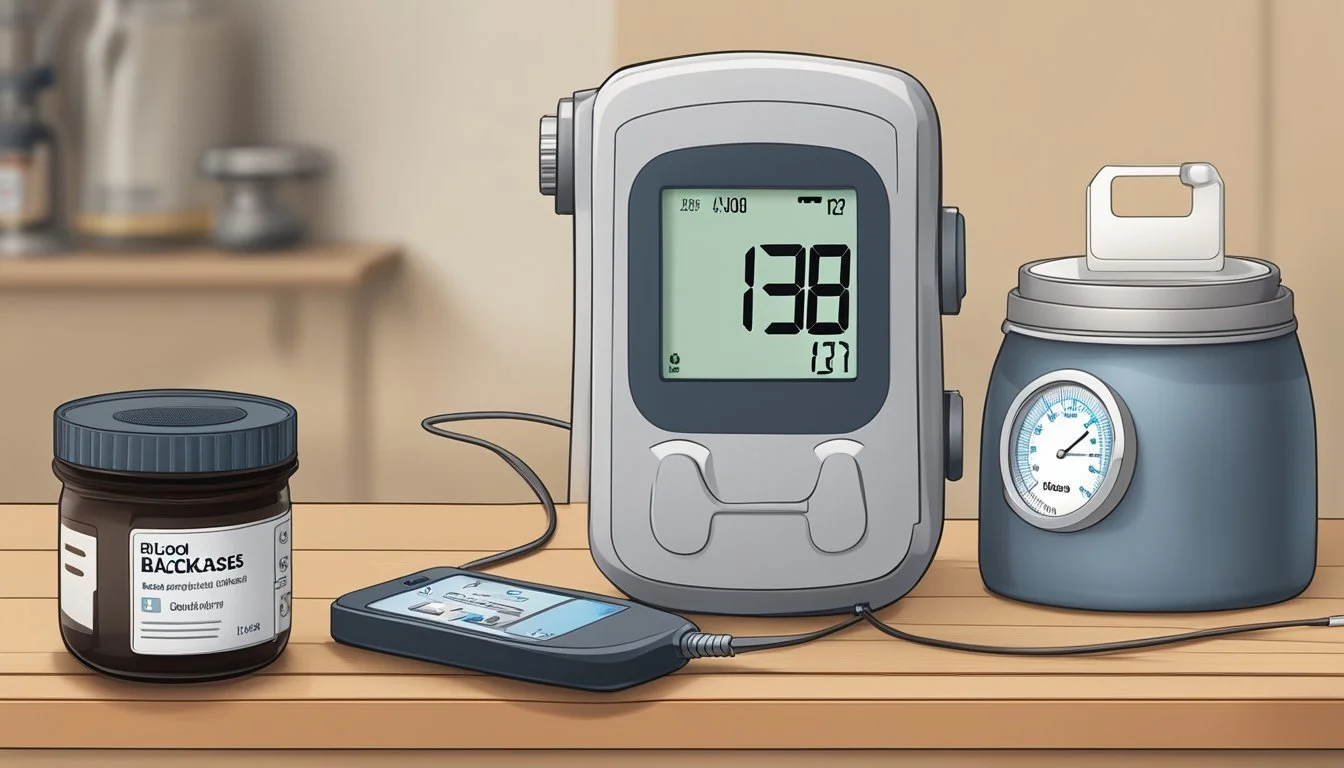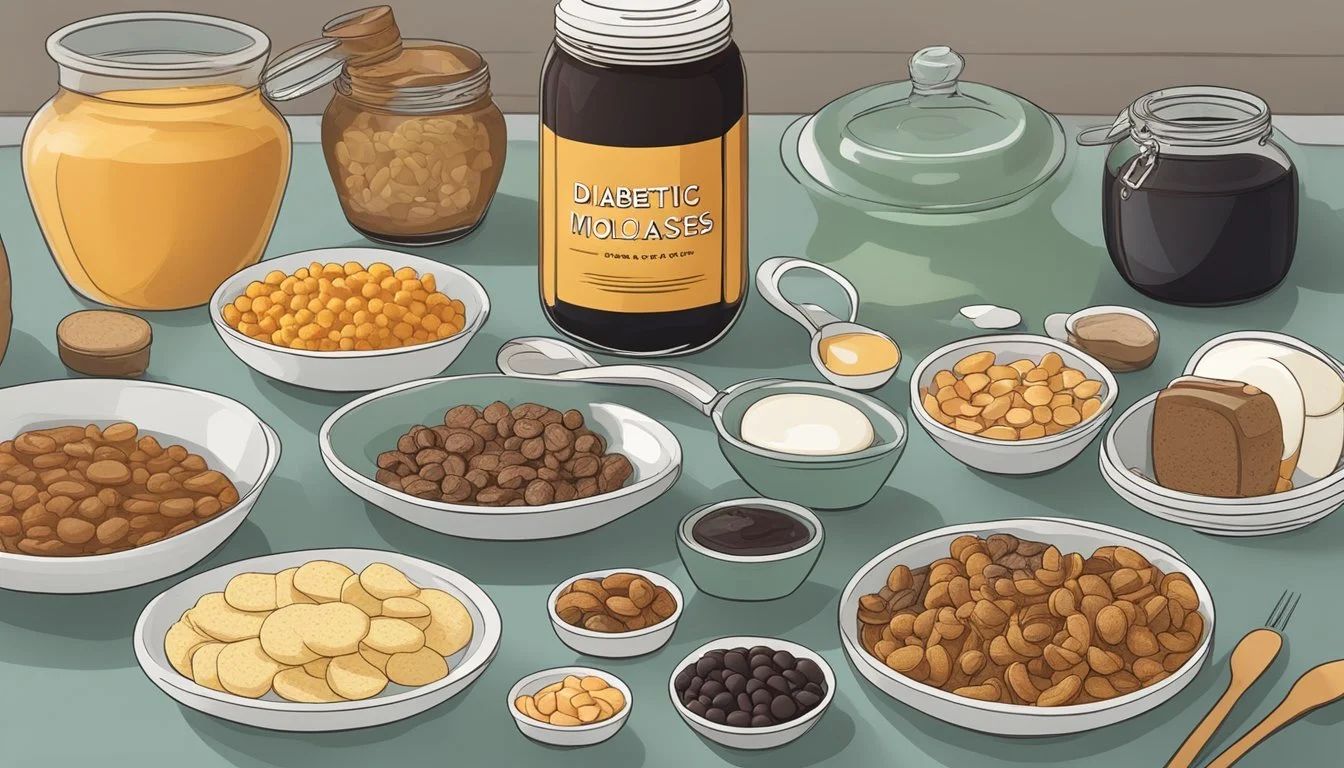Can Diabetics Eat Blackstrap Molasses?
Understanding the Health Implications
Navigating dietary choices can be challenging for individuals managing diabetes, especially when it comes to sweeteners. Blackstrap molasses, a byproduct of sugar refining, often raises questions about its suitability for diabetics. It is possible for diabetics to consume blackstrap molasses in moderation as part of a balanced diet.
Blackstrap molasses offers more nutrients than refined sugar, including iron, calcium, and magnesium. While it has a lower glycemic load compared to refined sugar, it still contains carbohydrates that can impact blood sugar levels. Diabetics need to monitor their intake and consult with healthcare professionals for personalized advice.
Given its nutrient profile, incorporating small amounts of blackstrap molasses might offer some health benefits without drastically affecting blood glucose levels. This blog will explore the potential advantages and considerations for those with diabetes, helping readers make informed dietary choices.
Understanding Diabetes and Dietary Considerations
Diabetes is a chronic disease that affects how the body processes blood sugar (glucose). Managing blood sugar levels is crucial for diabetics to prevent complications.
Diet plays a vital role in controlling diabetes. Consuming the right balance of carbohydrates, fats, and proteins can help maintain stable blood sugar levels.
Carbohydrates have a direct impact on blood sugar. Monitoring carbohydrate intake is essential, as it influences glucose levels more than fats or proteins. The American Diabetes Association recommends tracking carbs to manage diabetes effectively.
People with diabetes should focus on nutrient-dense foods. These include vegetables, whole grains, lean proteins, and healthy fats. Such foods help keep blood sugar stable and support overall health.
High-sugar foods can cause spikes in blood sugar levels. Diabetics should limit sugary snacks, beverages, and other refined carbs to avoid these spikes.
Regular monitoring of blood sugar levels is critical. It helps assess how different foods impact glucose levels and aids in meal planning.
Tips for Diabetics:
Balance: Always aim for a balanced diet with a mix of carbs, fats, and proteins.
Portion Control: Keep an eye on portion sizes to prevent over-consumption of carbs.
Read Labels: Check nutrition labels to understand the carbohydrate content and other nutritional information.
Healthy Snacks: Opt for nuts, seeds, or fruits instead of sugary snacks.
Maintaining a healthy weight is also important. Obesity can exacerbate diabetes and lead to other health issues. Regular physical activity and a balanced diet can help in managing weight.
Consult with healthcare providers, such as dietitians, for personalized dietary plans. The Centers for Disease Control and Prevention also provides resources for diabetes management.
Overview of Blackstrap Molasses
Blackstrap molasses is a thick, dark syrup derived from the third boiling of sugarcane. It stands out for its concentrated form, packed with nutrients and minerals.
Rich in iron, calcium, magnesium, and potassium, blackstrap molasses is a powerhouse of essential vitamins and minerals. A single tablespoon delivers significant amounts of these nutrients, supporting various bodily functions.
Nutritional Content (per tablespoon):
Calories: 60
Iron: 20% of Daily Value (DV)
Magnesium: 8% of DV
Potassium: 10% of DV
Calcium: 10% of DV
Blackstrap molasses also contains B vitamins, including vitamin B6, which aids in energy metabolism. Additionally, it offers antioxidant properties due to the presence of several nutrients with antioxidant activity.
This syrup is recognized for its strong, somewhat bittersweet flavor, making it a distinctive sweetener. It serves as a good alternative to refined sugar, offering nutritional benefits rather than empty calories.
The glycemic index of blackstrap molasses is lower than that of regular sugar, making it a potentially better option for those managing blood sugar levels.
Beyond nutrient content, it also contains trace amounts of other minerals such as zinc, phosphorus, and manganese, further contributing to its health profile.
Given its concentrated nature, consuming blackstrap molasses in moderation can contribute to bone health and overall energy maintenance. It is also reputed for boosting iron levels in individuals with deficiency, helping combat anemia.
Blackstrap molasses, with its myriad of vitamins, minerals, and antioxidants, can be a beneficial addition to a balanced diet.
Nutritional Profile of Blackstrap Molasses
Blackstrap molasses provides a rich array of nutrients that can be beneficial, while also serving as a moderate glycemic index sweetener. It is a source of essential minerals and often chosen as a healthier alternative to refined sugars.
Mineral Content and Health Benefits
Blackstrap molasses is notably high in important minerals.
A tablespoon provides high levels of iron, helping to prevent anemia. The magnesium content supports bone health and metabolic processes. Potassium aids in regulating blood pressure levels, while calcium is essential for bone density, potentially benefiting those with osteoporosis. Additionally, it contains manganese and copper, which play roles in enzyme function and the production of connective tissue, respectively.
This nutrient profile can make it a valuable addition to one's diet.
Caloric and Carbohydrate Analysis
Each tablespoon of blackstrap molasses contains approximately 60 calories.
The carbohydrate content is around 15 grams, primarily present as sugars and polysaccharides, offering a slower release of energy compared to refined sugar. It contains trace amounts of protein and virtually no fat or fiber, making it a relatively pure source of carbohydrates.
These characteristics make it a moderate-calorie option for sweetening foods, especially for those mindful of their caloric intake.
Glycemic Index and Sugar Alternatives
Blackstrap molasses has a glycemic index (GI) of around 55, making it a lower GI option compared to white sugar.
The lower GI means that it causes a slower rise in blood glucose levels, beneficial for people managing diabetes. It is considered a better alternative to refined sugar, which has a higher GI. While it should still be consumed in moderation, its nutrient density and lower impact on blood sugar spikes can make it a more suitable sweetener for those with diabetes.
Therefore, blackstrap molasses stands out as a practical and healthier sugar alternative.
The Impact of Blackstrap Molasses on Blood Sugar
Blackstrap molasses is a byproduct of sugar cane processing, offering a range of nutrients but also containing carbohydrates and sugars which can impact blood sugar levels.
Although not classified as a high glycemic food, its glycemic index can still influence blood sugar levels. It's essential for diabetics to monitor their carbohydrate intake, as the type and amount of carbohydrate consumed can significantly affect blood glucose levels.
A tablespoon of blackstrap molasses contains about 15 grams of carbohydrates.
People with diabetes can include modest amounts of blackstrap molasses in their diet. However, starting with no more than a teaspoon is advisable to minimize potential blood sugar spikes. Keeping an eye on the overall carbohydrate count is crucial.
Component Quantity per Tablespoon Calories 60 Carbohydrates 15 grams Protein 1 gram
It is beneficial to compare this with other sweeteners or foods that diabetics might consume. Testing blood sugar levels after consuming blackstrap molasses can help individuals understand its effect on their glucose levels.
Blackstrap molasses can be an option for those seeking an alternative to regular sugar due to its nutrient content. However, its impact on blood sugar should be carefully managed.
Usage and Serving Suggestions for Diabetics
Blackstrap molasses, although a nutritious alternative, contains sugars that may impact blood sugar levels. Diabetics need cautious integration into their diet and awareness of potential health implications.
Incorporating Blackstrap Molasses into a Diabetic Diet
Blackstrap molasses can be used in moderation as a sugar alternative in various dishes. A common recommendation is to replace part of the sugar in baked goods like cookies or cakes for added nutritional benefits such as iron and calcium. Due to its strong flavor, using small amounts helps balance its taste in recipes.
One tablespoon of blackstrap molasses contains around 60 calories and 12 grams of sugar. This makes it essential to monitor quantities to prevent sugar levels from spiking.
Including blackstrap molasses in salad dressings or brushing it on meats can enhance flavor without a significant impact on blood sugar. Pairing it with fiber-rich foods such as fruits further helps in managing glycemic response.
Potential Health Concerns and Restrictions
While blackstrap molasses offers health benefits, diabetics should be mindful of its sugar content. Excessive consumption can lead to undesirable spikes in blood sugar, potentially exacerbating conditions like heart disease or obesity.
Monitoring blood sugar levels is crucial when incorporating blackstrap molasses. It is advisable to discuss dietary changes with a healthcare provider to tailor the intake according to individual health needs.
Individuals with chronic diseases such as arthritis should consider the impact of adding any new food item. A balance is essential to leverage the nutritional value without compromising health. Blackstrap molasses should be part of a balanced diet, complemented by exercises and other health management strategies.
Comparing Sweeteners: Blackstrap Molasses vs. Others
When considering blackstrap molasses as a sweetener for diabetics, it's important to compare it to other molasses types and refined sugars. This can help understand its glycemic index, nutrient content, and flavor profile in relation to alternatives.
Blackstrap Molasses Compared to Other Molasses
Blackstrap molasses, derived from the third boiling of sugarcane or sugar beet juice, is less sweet than first or second boil molasses. It has a more concentrated, slightly bitter flavor and higher nutritional content, including minerals like iron and calcium.
Comparison Table:
Type Sweetness Nutrient Content Flavor Blackstrap Molasses Lower High (iron, calcium) Bittersweet, robust Unsulphured Molasses Higher Moderate Sweet, mild
This concentrated form has lower sugar content but provides essential nutrients, making it a more nutritious choice compared to other molasses.
Blackstrap Molasses and Refined Sugars
Refined sugars, such as white sugar and brown sugar, offer sweetness but little to no nutritional value. In contrast, blackstrap molasses contains vitamins and minerals, though it is not as sweet and has a distinct, bold taste that some may find less palatable.
Sweetener Comparison:
Refined Sugars: High in calories and sweetness; lacks nutrients.
Blackstrap Molasses: Lower glycemic index; contains nutrients like iron, magnesium, and potassium.
For diabetics, choosing blackstrap molasses over refined sugars can offer better blood sugar management and additional nutrients, but the strong, slightly bitter flavor may require adjustments in recipes.
Special Considerations for Specific Groups
When evaluating the inclusion of blackstrap molasses in the diet, specific considerations need to be made for various groups such as women, children, and the elderly. Each group faces unique health challenges that need special attention.
Women's Health: Menstrual Cycles & Bone Density
Blackstrap molasses can be beneficial for women, particularly concerning menstrual cycles and bone density. It is rich in iron, which is essential for replenishing blood during menstruation. This helps combat anemia, a common issue among women during their menstrual cycles.
Calcium in blackstrap molasses supports bone health. This is crucial for women as they are at a higher risk of osteoporosis. Magnesium in blackstrap molasses aids the relaxation of uterine muscles, potentially easing menstrual cramps. Incorporating this nutrient-dense sweetener could therefore support both menstrual health and bone maintenance.
Diabetes Management in Children
For children managing diabetes, blackstrap molasses presents a more nutrient-rich alternative to refined sugars. The impact of molasses on blood sugar levels is a primary concern. Blackstrap molasses has a lower glycemic index compared to regular sugar, meaning it causes a slower rise in blood sugar levels.
It provides essential vitamins and minerals, including iron and magnesium, which contribute to overall health. Parents should monitor their child's blood sugar levels closely when introducing blackstrap molasses to ensure that it does not cause significant spikes. Moderation is key, and it should be part of a well-balanced diet.
Elder Care: Managing Sugar Intake and Bone Health
In elderly individuals, managing sugar intake is crucial for controlling diabetes and maintaining bone health. Blackstrap molasses can play a role in both areas. Its lower glycemic index helps manage blood sugar levels more effectively than refined sugar.
Minerals like calcium and magnesium in blackstrap molasses promote bone health, reducing the risk of fractures. Vitamin B6 and selenium support overall health, making blackstrap molasses a valuable addition to the diet of elderly individuals. As with any sweetener, it should be consumed in moderation, and regular blood sugar monitoring is recommended to avoid any adverse effects.
Societal and Economic Factors of Molasses Consumption
Molasses production is linked to the sugarcane industry. This connection highlights its significance in global sugar production. As a byproduct, molasses offers a cost-effective option for multiple applications, making it economically favorable.
In Europe and other regions, molasses serves various purposes, including animal feed and biofuel. The use of molasses helps in reducing waste from sugar production, making it an environmentally friendly choice.
Societal trends also influence molasses consumption. With rising awareness about health and nutrition, blackstrap molasses appeals to those seeking more nutritious alternatives to refined sugar. It contains essential minerals such as iron and potassium, which are beneficial, especially for people with specific dietary needs.
Market prices for molasses can be influenced by several factors. USDA data indicates that affordability and effectiveness play key roles. For example, using molasses in agriculture as fertilizer is proven cost-effective, especially in settings where legumes and other crops are grown intensively.
Both consumers and industries benefit from the versatility of molasses. Its applications range widely:
Food industry: Natural sweetener
Agriculture: Animal feed, fertilizer
Energy sector: Biofuel production
Despite fluctuations in market dynamics, molasses remains a valuable commodity. Its diverse applications across different sectors ensure steady demand, supporting its continued significance in both societal uses and economic markets.
Environmental and Agricultural Impacts
The production of blackstrap molasses primarily involves the processing of sugarcane and sugar beet. Both crops have significant roles in agriculture.
Sugarcane is a major crop in tropical and subtropical regions. It requires substantial amounts of water and nutrients, impacting local water resources and soil health.
Sugar beet is grown in cooler climates and has its own environmental challenges. It typically involves intensive use of fertilizers and pesticides, leading to concerns about runoff and its impact on surrounding ecosystems.
Sustainable agricultural practices can mitigate some of these impacts. Farmers are increasingly adopting crop rotation, integrated pest management, and organic farming to reduce the environmental footprint.
Water usage remains a critical issue. Efficient irrigation practices, such as drip irrigation, can help conserve water in sugarcane farming.
Soil health can be supported by using organic fertilizers and maintaining biodiversity on farms. Protecting soil from erosion and degradation is vital for long-term sustainability.
The environmental impact of molasses production also includes the energy used in processing. Using renewable energy sources in mills can reduce carbon emissions.
To summarize, the environmental and agricultural impacts of blackstrap molasses production are significant. However, sustainable farming practices and resource management can help mitigate these effects.






